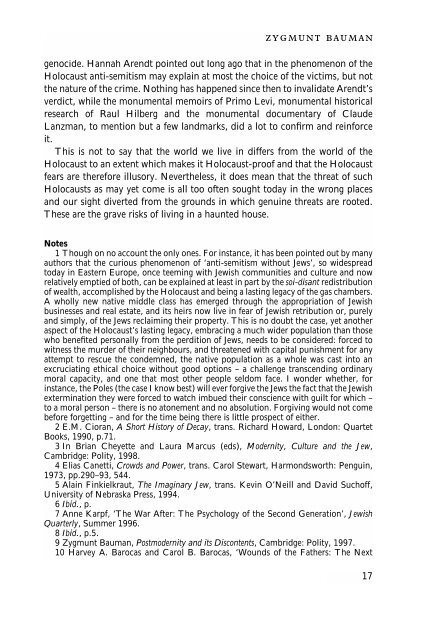You also want an ePaper? Increase the reach of your titles
YUMPU automatically turns print PDFs into web optimized ePapers that Google loves.
zygmunt bauman<br />
genocide. Hannah Arendt pointed out long ago that in <strong>the</strong> phenomenon of <strong>the</strong><br />
<strong>Holocaust</strong> anti-semitism may explain at most <strong>the</strong> choice of <strong>the</strong> victims, but not<br />
<strong>the</strong> nature of <strong>the</strong> crime. Nothing has happened since <strong>the</strong>n to invalidate Arendt’s<br />
verdict, while <strong>the</strong> monumental memoirs of Primo Levi, monumental historical<br />
research of Raul Hilberg and <strong>the</strong> monumental documentary of Claude<br />
Lanzman, to mention but a few landmarks, did a lot to confirm and reinforce<br />
it.<br />
This is not to say that <strong>the</strong> world we live in differs from <strong>the</strong> world of <strong>the</strong><br />
<strong>Holocaust</strong> to an extent which makes it <strong>Holocaust</strong>-proof and that <strong>the</strong> <strong>Holocaust</strong><br />
fears are <strong>the</strong>refore illusory. Never<strong>the</strong>less, it does mean that <strong>the</strong> threat of such<br />
<strong>Holocaust</strong>s as may yet come is all too often sought today in <strong>the</strong> wrong places<br />
and our sight diverted from <strong>the</strong> grounds in which genuine threats are rooted.<br />
These are <strong>the</strong> grave risks of living in a haunted house.<br />
Notes<br />
1 Though on no account <strong>the</strong> only ones. For instance, it has been pointed out by many<br />
authors that <strong>the</strong> curious phenomenon of ‘anti-semitism without Jews’, so widespread<br />
today in Eastern Europe, once teeming with Jewish communities and culture and now<br />
relatively emptied of both, can be explained at least in part by <strong>the</strong> soi-disant redistribution<br />
of wealth, accomplished by <strong>the</strong> <strong>Holocaust</strong> and being a lasting legacy of <strong>the</strong> gas chambers.<br />
A wholly new native middle class has emerged through <strong>the</strong> appropriation of Jewish<br />
businesses and real estate, and its heirs now live in fear of Jewish retribution or, purely<br />
and simply, of <strong>the</strong> Jews reclaiming <strong>the</strong>ir property. This is no doubt <strong>the</strong> case, yet ano<strong>the</strong>r<br />
aspect of <strong>the</strong> <strong>Holocaust</strong>’s lasting legacy, embracing a much wider population than those<br />
who benefited personally from <strong>the</strong> perdition of Jews, needs to be considered: forced to<br />
witness <strong>the</strong> murder of <strong>the</strong>ir neighbours, and threatened with capital punishment for any<br />
attempt to rescue <strong>the</strong> condemned, <strong>the</strong> native population as a whole was cast into an<br />
excruciating ethical choice without good options – a challenge transcending ordinary<br />
moral capacity, and one that most o<strong>the</strong>r people seldom face. I wonder whe<strong>the</strong>r, for<br />
instance, <strong>the</strong> Poles (<strong>the</strong> case I know best) will ever forgive <strong>the</strong> Jews <strong>the</strong> fact that <strong>the</strong> Jewish<br />
extermination <strong>the</strong>y were forced to watch imbued <strong>the</strong>ir conscience with guilt for which –<br />
to a moral person – <strong>the</strong>re is no atonement and no absolution. Forgiving would not come<br />
before forgetting – and for <strong>the</strong> time being <strong>the</strong>re is little prospect of ei<strong>the</strong>r.<br />
2 E.M. Cioran, A Short History of Decay, trans. Richard Howard, London: Quartet<br />
Books, 1990, p.71.<br />
3 In Brian Cheyette and Laura Marcus (eds), Modernity, Culture and <strong>the</strong> Jew,<br />
Cambridge: Polity, 1998.<br />
4 Elias Canetti, Crowds and Power, trans. Carol Stewart, Harmondsworth: Penguin,<br />
1973, pp.290–93, 544.<br />
5 Alain Finkielkraut, The Imaginary Jew, trans. Kevin O’Neill and David Suchoff,<br />
University of Nebraska Press, 1994.<br />
6 Ibid., p.<br />
7 Anne Karpf, ‘The War <strong>After</strong>: The Psychology of <strong>the</strong> Second Generation’, Jewish<br />
Quarterly, Summer 1996.<br />
8 Ibid., p.5.<br />
9 Zygmunt Bauman, Postmodernity and its Discontents, Cambridge: Polity, 1997.<br />
10 Harvey A. Barocas and Carol B. Barocas, ‘Wounds of <strong>the</strong> Fa<strong>the</strong>rs: The Next<br />
17

















